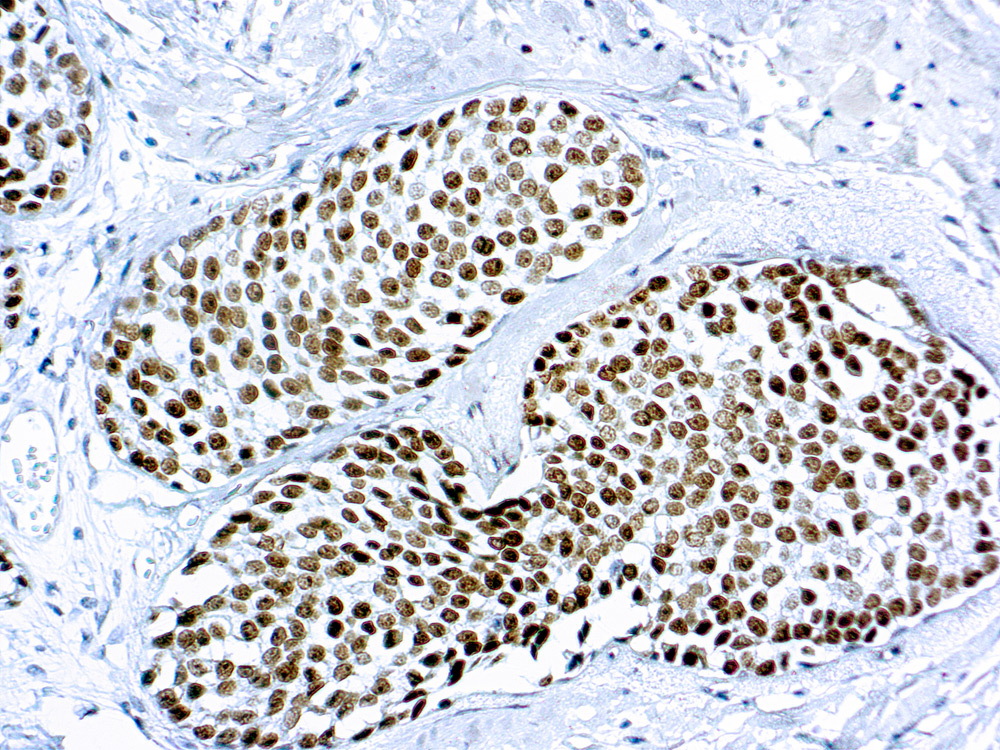Antibody (Suitable for clinical applications)
| Specification | Recommendation |
|---|---|
| Recommended Dilution (Conc) | 1:50-1:100 |
| Pretreatment | EDTA Buffer pH8.0 |
| Incubation Parameters | 30 min at Room Temperature |
Prior to use, inspect vial for the presence of any precipitate or other unusual physical properties. These can indicate that the antibody has degraded and is no longer suitable for patient samples. Please run positive and negative controls simultaneously with all patient samples to account and control for errors in laboratory procedure. Use of methods or materials not recommended by enQuire Bio including change to dilution range and detection system should be routinely validated by the user.
GATA3 Information for Pathologists
Summary:
One of 6 members of the GATA family of transcription factors. Involved in the luminal differentiation of breast epithelium, development of collecting system / urothelium and trophoblastic differentiation. Also master regulator of type 2 helper T cells. Essential features Nuclear marker with expression in many epithelial neoplasms (including most breast, urothelial, paraganglioma / pheochromocytoma and skin carcinoma; smaller percentages of lung, liver, pancreatic, gastric, renal, thyroid, endometrial, ovarian and salivary gland carcinoma).
Notable Clinical Features:
GATA3 mutations cause HDR (hypoparathyroidism, sensorineural deafness and renal dysplasia) syndrome (Ann N Y Acad Sci 2011;1237:24, Endocr J 2011;58:117). Uses by pathologists Differentiate metastatic urothelial and breast carcinomas (GATA3+) from many other metastatic carcinomas (Am J Surg Pathol 2014;38:13). Differentiate urothelial carcinoma (> 80% GATA3+) from prostatic carcinoma (2% GATA3+). Differentiate metastatic lobular carcinoma of the breast (GATA3+) from gastric signet ring cell carcinoma (GATA3-).
Common Uses By Pathologists:
Differentiate metastatic urothelial and breast carcinomas (GATA3+) from many other metastatic carcinomas (Am J Surg Pathol 2014;38:13). Differentiate urothelial carcinoma (> 80% GATA3+) from prostatic carcinoma (2% GATA3+). Differentiate metastatic lobular carcinoma of the breast (GATA3+) from gastric signet ring cell carcinoma (GATA3-). Differentiate squamous cell carcinoma of the skin (GATA3+) from squamous cell carcinoma of the lung (GATA3-). Differentiate mesothelioma (81% GATA3+) from pulmonary adenocarcinoma (12% GATA3+).
| GATA3 General Information | |
|---|---|
| Alternate Names | |
| Molecular Weight | |
| 47.9 kDa | |
| Chromosomal Location | |
| p14 [chr: 10] [chr_start: 8045378] [chr_end: 8075198] [strand: 1] | |
| Curated Database and Bioinformatic Data | |
| Gene Symbol | GATA3 |
| Entrez Gene ID | 2625 |
| RefSeq Protein Accession(s) | NP_002042; XP_005252499; XP_005252500; NP_001002295 |
| RefSeq mRNA Accession(s) | XM_005252442; NM_002051; XM_005252443; NM_001002295 |
| RefSeq Genomic Accession(s) | NC_000010; NG_015859 |
| UniProt ID(s) | P23771 |
| PharmGKB ID(s) | PA28586 |
| KEGG Gene ID(s) | hsa:2625 |
| Associated Diseases (KEGG IDs) | Hypoparathyroidism, sensorineural deafness, and renal disease (HDR) [MIM:146255]: A disease characterized by steroid-resistant nephrosis with progressive renal failure, hypoparathyroidism, sensorineural deafness, and renal dysplasia. {ECO:0000269|PubMed:10935639, ECO:0000269|PubMed:11389161, ECO:0000269|PubMed:26514990}. The disease is caused by mutations affecting the gene represented in this entry. |
| General Description of GATA3 . | |
| GATA3 binding protein 3 or GATA3, is a zinc finger transcription factor and plays an important role in promoting and directing cell proliferation, development, and differentiation in many tissues and cell types. The human GATA3 gene has been mapped to chromosome 10p15. GATA =3 expression is primarily seen in breast carcinoma and urothelial carcinoma. Anti-GATA3 can also be useful in the identification of unknown primary carcinoma when carcinomas of the breast or bladder are a possibility | |




Reviews
There are no reviews yet.